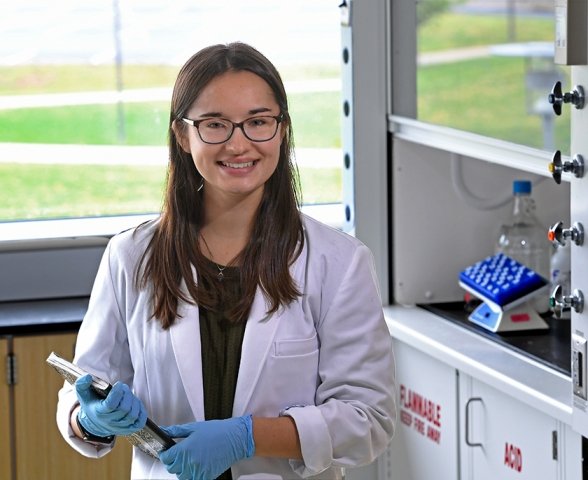Biomedical engineering major earns a Goldwater Award
Biomedical engineering major earns a Goldwater Award

Elizabeth Bealer hesitates just a little as she looks to the future, anticipating that in her lifetime organ regeneration may be possible.
“Some predict we’ll have the ability to regenerate an arm, for instance, by 2030,” she said. “I think that’s a little generous.”
What might sound like science fiction to most people simply sounds like science to Bealer, a 21-year-old junior biomedical engineering major in the Henry M. Rowan College of Engineering and member of the Thomas N. Bantivoglio Honors Concentration at Rowan University and the institution’s latest winner of a Goldwater Award from the Barry Goldwater Scholarship & Excellence in Education Foundation.
The Goldwater Scholarship is widely considered one of the most prestigious awards in the United States for undergraduates in natural science, mathematics and engineering and this year awarded a record 496 scholars from among 5,000 applicants. The Foundation has awarded more than $68 million in scholarships since 1989. According to the Goldwater Foundation, Goldwater Scholars were selected based on academic and research merit from natural science, mathematics and engineering students nominated by 443 colleges and universities nationwide. Recipients were evaluated based on their academic and research accomplishments and potential for success toward advanced degrees.
Bealer, winner of Rowan’s second Goldwater in three years, is up for that.
All-around outstanding
The Pottstown, Pennsylvania native not only is an academic standout (just one A- in college, and that in a physics class), she also is an experienced researcher and an active volunteer and student worker on campus.
Bealer didn’t start out to become an engineer. “When I was in high school, I considered going to medical school, but I really didn’t want to give up math – so I combined both interests in a way,” Bealer said. “I think biomedical engineering is very cool, very interdisciplinary, a way to tie in different types of engineering disciplines, like chemical, mechanical and electrical engineering.”
She’s been working on research in the lab of her research mentor, Dr. Mary Staehle, an associate professor of biomedical engineering, developing novel approaches to detect and study the effect of chemicals on brain development. Currently, it is exceptionally difficult, if not impossible, to determine how chemicals affect the complex processes of brain development. With the advent of so many new chemicals, there is a need for preliminary screening of new chemicals prior to human exposure. So Bealer and the Staehle lab are developing a worm-based screening tool.
Key part of research
“Liz has been instrumental in the development of our new approach to studying neurodevelopmental toxicity. Her work will impact human health and lead to smarter chemical design. I could not be happier for her for this well-deserved recognition of her hard work and achievements. She has a bright future ahead of her,” Staehle said.
Outside of the lab, Bealer is a Rowan Admissions ambassador, with responsibilities that include guiding tours for prospective students and their families; a mentor in the honors program; service chairperson for the Rowan chapter of the Society of Women Engineers; and a student grader for a program in the College of Engineering.
The daughter of Don and Lisa Bealer and sister of Megan and David, Bealer is a 2016 graduate of Owen J. Roberts High School, in Pottstown, and will be the first engineer in her family.
Last summer, Bealer participated in a National Science Foundation Research Experiences for Undergraduates at Rensselaer Polytechnic Institute in Troy, New York, working on pressure sensors. This summer, she will intern at Regeneron Pharmaceuticals in the Albany, New York, area, working as a quality control engineer.
Looking ahead
After graduation, Bealer plans to pursue a Ph.D. in biomedical engineering with a concentration in tissue regenerative engineering.
Her goal is to make a difference in health, first working in industry and later possibly in academia, conducting research that leads to the development of diagnostic or therapeutic tools in tissue engineering.
“I think that’s the coolest aspect of biomedical engineering – the fact that we are getting close at this point to having therapeutic strategies to use skin grafts or ultimately full organ regenerations,” said Bealer, who for fun plays intermural soccer, watches “The Office” and hangs with her roommates – engineering majors all.